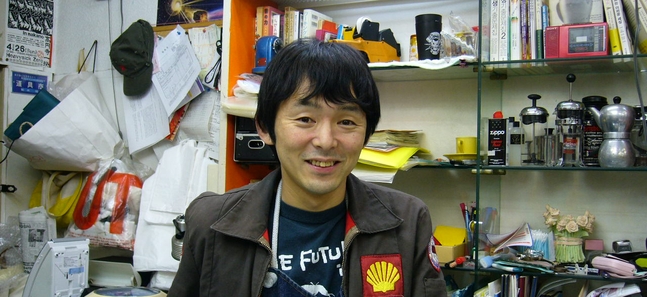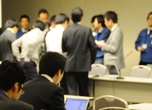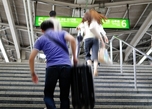Japan's anti-nuke agitator speaks out
Time Out talks to Hajime Matsumoto, the man behind this weekend's anti-nuclear demo

Hajime Matsumoto prepares to hit the streets. Photo by Chiho Fukami
Posted: Thu Apr 07 2011
The April 10 anti-nuclear power demonstration, being held in Koenji Chuo Koen, is a fascinating prospect. While public protests aren't unheard of in Japan, they haven't well publicized or supported since the early '70s. But, as with so much else that's going on here at the moment, this is in a state of flux. Recent marches in Ginza and Shibuya saw numbers swell to as much as 40 times the expected attendance, and with big names signing up to participate in the Koenji protest, there's a feeling that the usually apathetic, politically disengaged youth of Japan could be about to take to the streets in swathes.
While the event initially had a kind of guerilla quality to it, an organizer was eventually unmasked, and few observers were surprised to find Hajime Matsumoto, founding member of the political artistic collective 'Amateur Revolt' (Shirouto no Ran), at the root of it all. Keen to spread the word, he sat down with Time Out Tokyo to discuss, among other things, his own political past and his vision of a non-nuclear future.
A recent demonstration in Ginza (March 27) saw 1,200 protestors in attendance – 40 times more than the usual turnout. What do you realistically expect to see at the April 10 event?
I don’t know what to expect, but I would imagine a couple of thousand protestors will turn up. This demonstration has no precedent; it’s not part of an ongoing anti-nuclear power demonstration. The average turnout for a demonstration in Koenji might be around 200 to 500 people, but this time the information has been put about via Twitter and other internet outlets, and an actress called Miyuki Matsuda (the widow of legendary Japanese actor Yusaku Matsuda) is spreading the word, though she's not able to attend herself. Considering the other artists that are participating, I think the demonstration will be on a large scale.
As a British writer, I'm used to seeing and participating in peaceful street demonstrations, but it's something we rarely see on a large scale in Japan. Do you think it's possible to really politicize Japanese youth?
I think the youth of Japan have already been politicized in their thinking. We were able to remain ignorant of bad policies and social issues, and just enjoy our affluence. However, this disaster and crisis has affected our lives so much – especially in Tokyo and Tohoku – and people who weren't into politics are developing strong feelings against nuclear power plants. Also, I would like to emphasize the point that because this is a large scale demonstration not run by labour unions or political organizations, I think it will be quite a unique experience. There will be many more demonstrations organised like this one over the coming months, but I think this will set the bar lower for Japanese youth to participate in the broader political movement.
What did you learn from participating in the 2007 local ward elections? Do you think you can achieve your goals by participating in the traditional political process?
I don't believe that the current political process will make our society any better. If anything, it has a negative effect. Even if you vote for a politician, having a 'politicians will make society better' type of mindset in itself negates social participation. I'm not against the election system itself, though…
I didn't intend to become a politician when I participated in the 2007 local ward election. Japan is strict on street activities, so you only get to go out in the open if you run as a candidate. I took advantage of the system to express what we wanted to do, and it got lots of attention. We did street performances and theatre, and many conservative people were surprised by it, while young people were enthusiastic. I think it worked out pretty well.
Your event is a campaign against nuclear power, but what do you see as being the alternatives?
I have no idea (laughs). To give you a few examples, there's solar power, geothermal heat and wind power. I have heard about seismic power but I’m not an expert, so I'm not sure. However, one thing I am certain about is that I’d rather live with much less electricity if it comes with the kind of risk we are seeing now. Japan’s electricity use is excessively wasteful. Seeing 20 vending machines lined up on the side of the street is just one example. I think there are lots of possible alternatives, but our top priority is to stop the nuclear power plants.
Also, I want to point out that gatherings are environmentally effective – they're more fun and use less electricity compared to each person individually using power at home. Imposing voluntary restraint on hanami parties [as Tokyo Governor Ishikawa attempted to do last week] is the complete opposite. They should encourage year-round hanami parties to save electricity (laughs).
We had a huge response when we posted information about your anti-nuclear power demo on our website, mostly from foreign readers. Does that surprise
you?
No. The Japanese media is deliberately downplaying the crisis by saying 'we are safe' and 'there will be no immediate effect.' However, the foreign media has been reporting that the situation is 'highly dangerous' and 'this is the worst accident.' So it's no surprise that foreign people responded differently. Many of my friends called and sent e-mails from overseas saying, 'How come Japanese people are saying they are safe and OK? It’s not safe!'
Why is the event taking place in Koenji Park? Why not
somewhere that forces TEPCO to see it?
Many young people are furious. I think it’s natural for the event to take place in Koenji, where young people make up a significant percentage of the population. Though I think demonstrations against the government and TEPCO are needed, this demonstration was planned by a number of people who live and work in Koenji. The crisis is casting a shadow over the safety of our livelihoods, so I think it's natural to raise our voices from the place where we live.
At the time of writing these questions, we've yet to see a lineup for the event. Who can we expect, and who would be your dream headliner?
We've announced our musical lineup (Time Out readers can find the information here). We're still negotiating with the speakers, but Karin Amamiya, a writer and author, and Nao Suguro, a member of the ward assembly, will participate – along with others. I'm looking forward to hearing the voices of the participating artists too. My dream headliner would be Kiyoshiro Imawano, but he's passed away. Personally, I would love to see Shigeru Izumiya...
Is there any way our readers can get more involved
with activities such as this? Are there any newsletters or mailing lists?
You can join the Shirouto no Ran mailing list to get information about events such as gigs, movie screenings and public talks (sorry, but the info is only in Japanese). However, we are here to develop an alternative community and space, so normally we don't take on the issue of nuclear power. If you're interested in learning more about nuclear power issues, contact my shop and I can connect you with the anti-nuclear power groups. I prefer direct communication, so you're welcome to come by and join me for a beer any night.
Hajime Matsumoto runs Shirouto no Ran No. 5, 3-9-11 Koenji-Kita, Suginami-ku (03-3330-2939). Click here for information on the lineup and event times for the April 10 anti-nuclear demo
Tweets
- About Us |
- Work for Time Out |
- Send us info |
- Advertising |
- Mobile edition |
- Terms & Conditions |
- Privacy policy |
- Contact Us
Copyright © 2014 Time Out Tokyo














Add your comment